Chad Smith talks The Getaway, Ginger Baker and three decades as a Chili Pepper
Steve White puts the questions to the rock legend
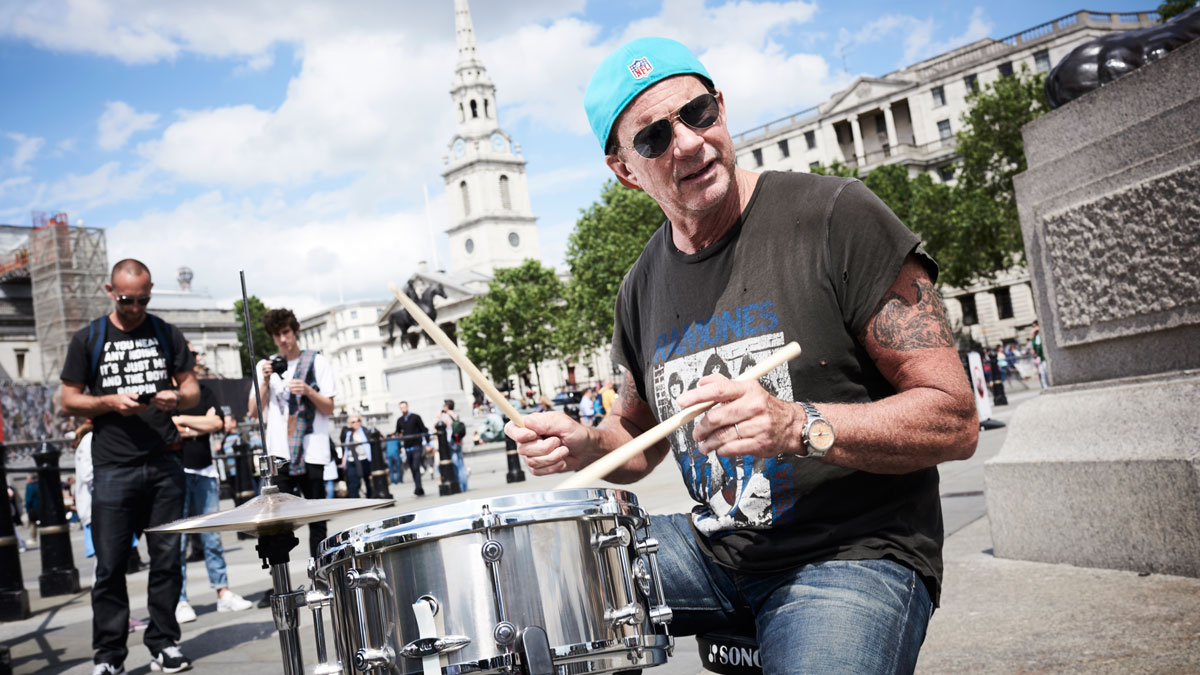
Old friends reunite
One is the king of stadium funk-rock, the other is the Mod master of blue-eyed soul, but Chad Smith and Steve White have been friends – as well as fans of each other’s playing – for years.
“We met at a drum show in 1999 when we were both presented with awards by Rhythm, presented by Kenney Jones,” says Steve. “Louise King [then Rhythm editor] had suggested we play together so we had a little run-through and then went and did it. I think Brian May joined us on guitar!”
In 2000 the two drummers joined forces for With Attitude, a clinic tour that broke attendance records around the UK. Eight years later, the sequel produced another sold-out run and now they meet again in a posh West London hotel to catch up, swap news about friends and family, and to talk about the Red Hot Chili Peppers’ new album.
The Getaway is the Peppers’ 11th studio album and their first record since Mother’s Milk in 1989 without producer Rick Rubin. Over breakfast – Steve has a bacon butty and tea, Chad the full English and coffee – they get stuck in, discussing influences, Elton John, and surviving a life in music.
We’re like, ‘We don’t know about this. We’re the Chili Peppers! We play live! That’s our thing!’
Steve: “I love the new record, I had it pumped up the other day, the kids were dancing about to it. Quite a departure for the 11th studio album. The change of producer from Rick Rubin to Brian Burton, was that something that you really felt, as a band, needed to happen, or was it circumstance? Because Flea had an accident, didn’t he? Quite a bad break in his arm, which is not good for a bass player.”
Chad: “We love Rick Rubin obviously, he’s an amazing producer and a great friend of ours, we’ve had great success with him but we really felt it was time to switch things. We felt we were in danger of going down the route of making another rock album, everybody on the floor cutting the songs and Rick’s going to do his thing but it was time for a change.
“We knew Brian Burton, we’d toured with him, he was in Gnarls Barkley among other things. He came down and heard some of our songs. This was before Flea broke his arm. We’d written our songs the normal way, we get in a room, bang out ideas. Flea breaks his arm snowboarding with Lars [Ulrich]. He broke it bad, his hand was numb, it was a really hard, emotional, spiritually challenging time for Flea and it took him six months to properly heal.
“During that time Brian was like, ‘I like the songs you guys have got but if you really want to get what I do and use my talent or forte, let’s go into my studio and we’ll just start cutting songs from scratch.’ We’re like, ‘What? What do you mean, start from scratch?’ He’s like, ‘Come in, Chad, you and me will work on some drum beats and we’ll layer stuff. Then Flea will come in and Josh will come in.’ He’s got a hip-hop background and that’s how that stuff is done, this is just a more organic way, obviously live drumming.
“We’re like, ‘We don’t know about this. We’re the Chili Peppers! We play live! That’s our thing!’ But because it was time for a change and to do something new, okay, let’s give it a shot. And that’s really what we did. We probably cut nine new things that way and right off the bat it was working. We’d sit down and listen to music and talk about stuff together and listen to old psychedelic, weird music, he’s got quite an interesting taste in music. We’d come up with music that inspired us, then I’m going to go in and play something in that vibe, not try to copy it...”
Steve: “Just take some influence.”
Chad: “Exactly. But I’m in there playing drums by myself in the studio.”
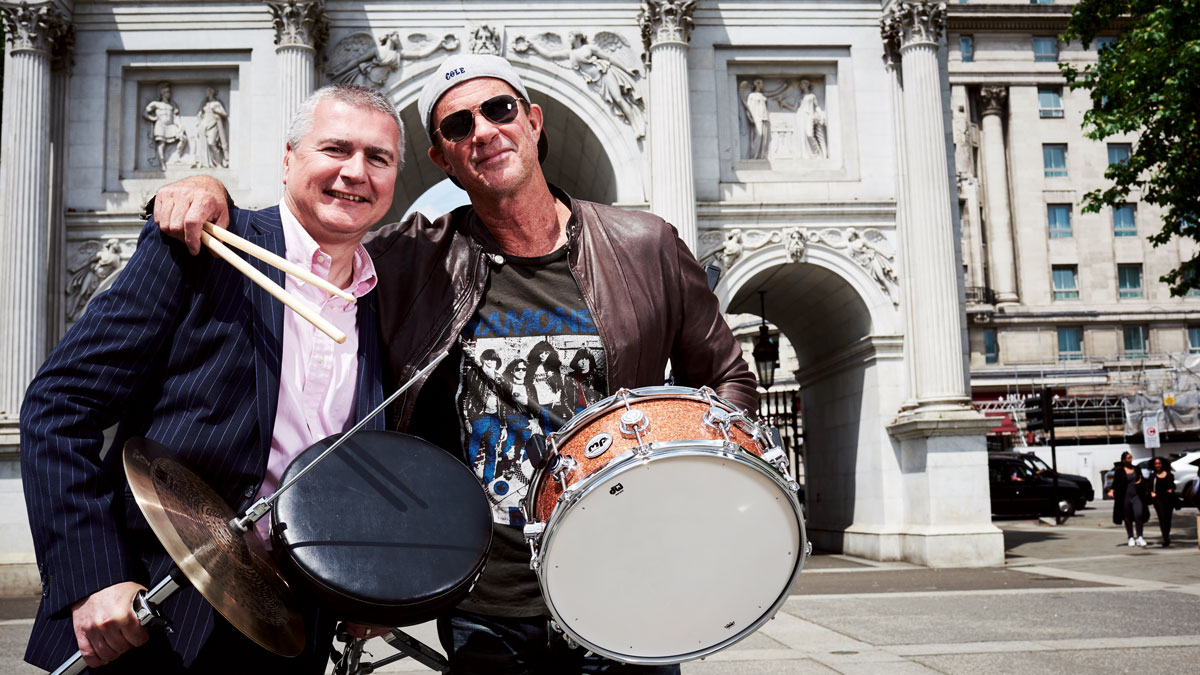
A big departure
Steve: “That is a big departure from the way you record with the band.”
Chad: “I never do that, certainly not with the Chili Peppers. We’d come up with ideas and then we’d go back and forth, ‘Try that, more kick drum, half-time on the hi-hat.’ I’d play a bunch of beats and rhythmic ideas and then he would cut them up and make them into loops. ‘What do you think of this?’
There were old Ludwig drums with tape on them and tea towels, a little four-piece kit, it looked like Ringo-era to me, and I used his stuff. I didn’t use any of my stuff.
“So we’d work together on that and then Flea would come in and he would play stuff, just out of nowhere, and they would work together coming up with ideas, chord changes, rhythmic ideas.
“Then Josh would come in, piano, keyboards, guitar, whatever he would play, then we would send them to Anthony and say, ‘We like this, we like that, come up with something melodic or a vocal idea,’ and that’s how we did eight or nine songs. We ended up with six of them – Dark Necessities, We Turn Red, The Getaway are some of the ones that were born out of that new method.
Steve: “You can really hear the influence of the producer, especially in the drum sounds. For me, it has brought out a lot more of your soulful playing. I can hear elements of James Gadson in there, that influence. It’s got almost a classic funk element to it.”
Chad: “I have to tell you about that. Usually I would get in and I want to have the best drum sound, the bright drums and the ringy snare, that’s sonically pleasing to me. When I went in with Brian it was like, ‘You’re in my studio,’ I just handed it over to him.
“There were old Ludwig drums with tape on them and tea towels, a little four-piece kit, it looked like Ringo-era to me, and I used his stuff. I didn’t use any of my stuff. I’m playing and I tend to play hard and powerfully and he’d be like, ‘Okay, it sounds good but if you play lighter, I can have more manipulative options sonically, I can get different sounds.’
“I’m playing by myself, we don’t know what’s going to be on top of it. He says, ‘If you play lighter then I can really crank up the compression and use this room mic...’ and on and on. I’m playing Dark Necessities, doing this 16th-note groove, I’m maybe even playing traditionally with my left hand which I very rarely do, but it was a challenge to play quietly with intensity.
“It’s easy to bash away loud and play fast but to play quietly and still make it groove was challenging for me. I hadn’t really done that before. It still has to groove obviously, so that makes you play different. I’m still going to sound like me but the drums are tighter, warmer.”
Steve: “I think it’s a real departure. I absolutely love the ballad The Hunter and Dreams Of A Samurai. Now to me, I don’t like making comparisons, but the drumming has shades of early Phil Collins, Genesis. It’s in 5/4 isn’t it?”
Chad: “Either 5/4 or 10/8. That was one we had that just came off Flea’s bassline and I didn’t know the time signature, I just played to his bass groove. That’s one where we just played it live on the floor. We had the main riff but that was the only part we had.
“Brian really liked it, it’s like Pink Floyd but different, but we need another part like a chorus. So we wrote that chorus part in 4/4 and played it twice, and then cut it and maybe the second take is the one you hear on the record. I get to play a little bit more on that.”
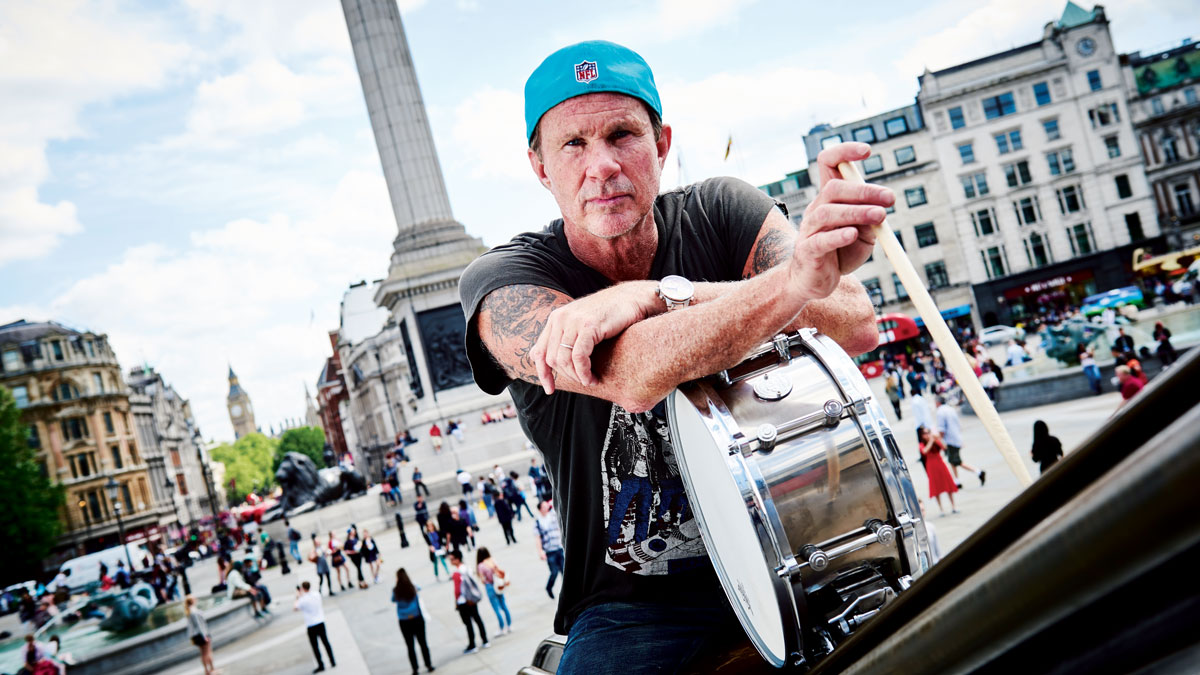
To be a professional musician is all I ever wanted to do...
Steve: “We toured 15 years ago and that’s incredible, so what are your thoughts about the changes in the music industry?”
Chad: “The music industry has changed for sure. Our record came out last week. In the United States how they base your record sales now is sales plus streaming. We sold 100-whatever-thousand records, CDs, downloads, Drake sold 38,000 records but his streaming made him Number One and we’re Number Two by 6000 streams or something. Eight weeks in a row he’s been at Number One. It’s not a competition about music or anything but that’s obviously very different.
“Whatever people like is great and as long as they’re exposed to it, I’m all for it, the internet and however people find out about music. But to be in a band, starting out, not to sound like an old fogey, but you’ve got to do it the old fashioned way, hard work, put in the time, put in the effort.
Not to sound like an old fogey, but you’ve got to do it the old fashioned way, hard work, put in the time, put in the effort.
"I’m not a big fan of these American Idol shows, X Factor and that stuff. You’ve got to get in a garage, figure out how to write good songs and go out and play – if there are places to play. That, I don’t really know about.”
Steve: “It’s not that thing of, ‘Oh, it was better in my day,’ because every generation has a different set of circumstances that they have to struggle with. The quality of drums you can get now for $500...”
Chad: “You can get a great drumset now! We’re lucky, I feel very grateful to be able to make new music that’s relevant and people care about it and want to buy it and come see us play.
“I can only control my little world but at the end of the day it’s hard work, there are no shortcuts. You’ve got to put in the work, you’ve got to play a lot and that’s the way to give yourself opportunities to be exposed to good things, other people, other good musicians. Just do it and if you love it, you’re going to want to do it.”
Steve: “You’ve got an amazing career and you’re still very positive which is great to hear, because I think music has become quite a conservative industry in lots of ways, so what would you consider on a personal level is one of your career highlights? Something you feel really proud of and what career ambitions do you still have left?”
Chad: “I’m so grateful and so appreciative and so fortunate – moving to California in 1988 and six months later I’m playing with the Red Hot Chili Peppers who at that time were a band that was in a bit of disarray, the guitar player had just passed away, I didn’t think that the Red Hot Chili Peppers would be a band 30-whatever years later.
“Just to be a professional musician is all I ever wanted to do. I just want to play the drums and make a living. Still I always stay focussed as much as possible, we all have our ups and downs through many years and do things that influence you for the good and the bad but it’s all part of the journey. I’m still here and I love it.”
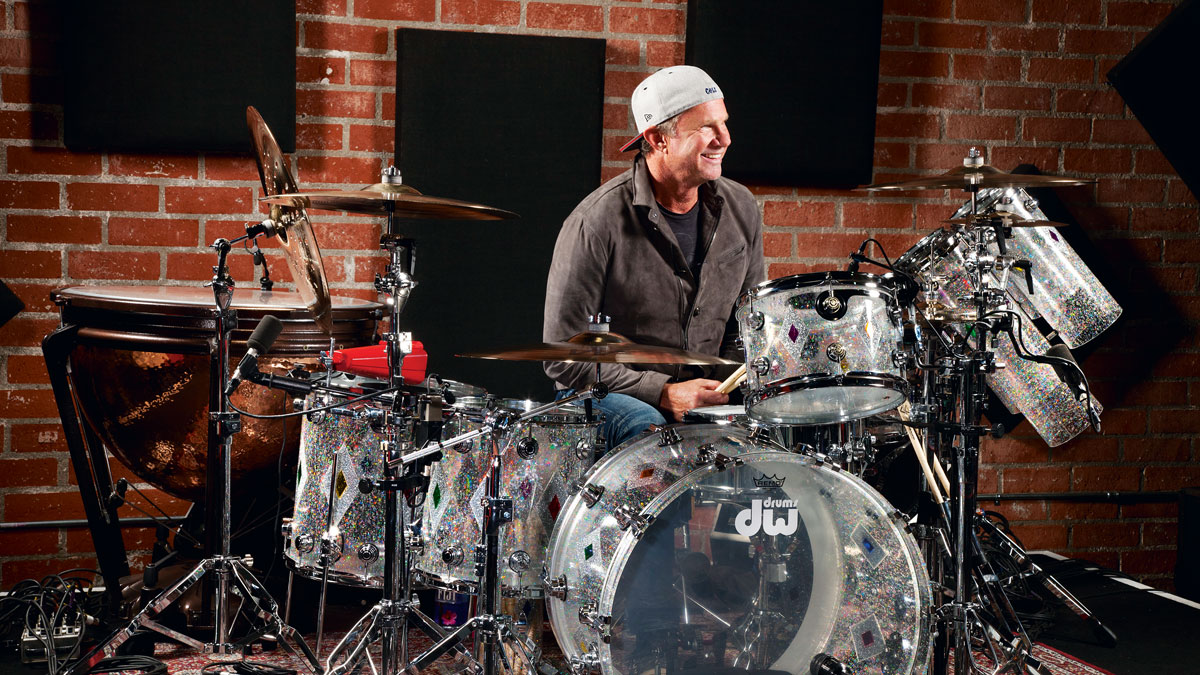
Finding inspiration
Steve: “I know we share very similar musical tastes but have you got any drummers that you constantly go back to for inspiration and a little bit of spark?”
Chad: “I was with Taylor from the Foo Fighters, we did this thing together, not too long ago and he has this band called Chevy Metal which is like a cover band with his buddies from Laguna Beach. We played this festival after-party and Flea came and we played Jailbreak from Thin Lizzy, Miss You from the Stones, I played some Van Halen and some Queen, Taylor’s musical taste.
“We were talking on the plane afterwards and Flea goes, ‘You know, I get why you and Taylor love that music,’ because those English bands like Led Zeppelin, Queen, Black Sabbath, Deep Purple, Ginger Baker, those guys, that music and those drummers in those bands, the mid- to late-’60s was the first time that that kind of music happened.
“Jimi Hendrix, the explosion of that hard blues-rock based thing that the Stones and the Beatles started in England. No one had applied that drumming to that kind of music before, because it was really a new thing at that point.
"And so, not to say that the Stewart Copelands and everybody else that has come since didn’t have their own thing, but it’s all still based in that, it really is. So that makes sense that I go back to that, because when I was growing up, that’s the stuff that I listened to.”
I don’t care what Ginger Baker’s like, I don’t want him to be my best friend, I hope he’s doing great and rocks on forever because he’s brilliant.
Steve: “Jon Lord, who I had the privilege to work with, said, ‘We were writing the book, we just didn’t know it.’”
Chad: “It was uncharted territory. So to have guys like Ginger Baker playing in Cream, he was a jazz guy. Charlie [Watts], total jazz guy. Charlie, who I had the good fortune to interview, he told me Ginger Baker was by far the best jazz drummer in England.”
Steve: “He was, yeah, alongside Phil Seaman who was his tutor. There were some amazing players at that time, Bobby Orr, Ronnie Verrell, Allan Ganley, all those great players, but Ginger could swing. And he’s such a lovely guy. I don’t care what Ginger Baker’s like, I don’t want him to be my best friend, I hope he’s doing great and rocks on forever because he’s brilliant.”
Chad: “He’s Ginger, one of a kind.”
Steve: “You did look a little intimidated when you interviewed him.”
Chad: “Oh my god!”
Steve: “Keeping away from that cane!”
Chad: “He was tough. But yes, those are the guys that I still go back to. There are lots of great drummers and great musicians but that’s special to me and that makes sense to me. That’s why we keep going back to those guys. Mitch Mitchell playing with Jimi Hendrix, that’s not ever going to happen again.”
Steve: “And probably something that only could have happened in London as well because a white guy and a black guy in the same band would never have got on the TV in the States at that point.”
Chad: “Probably not. It was a magical time, it was a unique time in rock music and that really resonates with me to this day.”

Surviving music
Steve: “We’ve played together many times and I’ve seen what a versatile player you are.
"You do have that grounding in funk and soul, not just what funk is in terms of the Chili Peppers, but black-influenced, Detroit, Motown and you can hear that in the record.
"Talking about maturity, I think that’s a really good thing because as we are getting a little further down the road, the sheer physicality of the way you play, you’re going to have to change as you get a little older.
I’m not 25 years old. I still beat the crap out of the drums.
You don’t want to be beating the crap out of the drums, it’s nice to be able to do it but it’s nice to have somewhere else to go with it and that’s what I really heard on this record.”
Chad: “It has to be an honest representation. I’m not 25 years old. I still beat the crap out of the drums. Come see us live and we still do our thing, but when it’s appropriate. Play what’s appropriate for the music. That’s being a good musician. I don’t always achieve it but I reach for that.”
Steve: “Do you have any routines on the road for preparing for shows? Are you looking after yourself?”
Chad: “It’s just rest and everything in moderation. I don’t have any rituals. The other guys have to eat at this time, and Flea is playing an hour before the show. As far as playing, I’m fortunate, I have a little drumset in the back and I can warm up on that to get the juices flowing.
“I’m off the drugs and the booze for eight years now. Anything you have to do to be able to be relaxed when you go out and play, that’s when we play the best. I like to go out and see the crowd, I chat with the other bands. I don’t have a ritual.
"Whatever it is to be relaxed before you play, I think that’s the best thing to do. Not too many late nights, I did a lot of those.”
Steve: “Going into the hotel now, it’s not ‘Where’s the bar?’ It’s, ‘What’s the Wi-fi code?’”
Chad: “I go past the bar now. I did one Chickenfoot album where Andy Johns was our producer/engineer, bless his soul. We would go and record all day and he would have these little red cups everywhere in the control room, in the tracking room.
I’m here to play and perform for those people who put their hard earned money down and I want it to go really well and to do the best that I can. That’s all.
"Andy liked to have his cocktails so by six o’clock the session would wind down because Andy was a little loose and then Uncle Andy would tell us about Led Zeppelin and the Rolling Stones and we’d get our stories out of him.
“We were staying at this hotel not too far away and I was newly sober at the time. I’d go back to the hotel, wave to the front desk, go past the bar, and Andy would make a left and he’s got a whole tray full of martinis, six of them, and he’d take them back to his room.
"This was nine, 10 o’clock at night. I was going, wow, man. I’d be like, ‘Okay, good night Andy.’ ‘Join me for a nightcap?’
“He wasn’t a young man. Do what you want kids, go crazy or not, but at a certain point it just doesn’t work for me anymore. I had my share of going for it and I don’t have any regrets about it, but at a certain point you have to take a little more control of your life and get more focused and I needed to do that. So that’s what works for me now. Families, kids, there is a list of priorities.”
Steve: “When you come off stage and you’ve played well and you hear that crowd, the day doesn’t get any better than that. If you can’t wind down from that, you’re looking for another high. You’re not going to find it. You might get close but it’s not as good as that.”
Chad: “You’re chasing it. And I just want to perform really well now, as well as I can, and the whole band does. It’s really important to us to play well. This is my job. It’s a good job, it’s a great job, but I’m not here to party where the gig is getting in the way of all my other social activity.
"I’m here to play and perform for those people who put their hard earned money down and I want it to go really well and to do the best that I can. That’s all. Everything else revolves around that.”
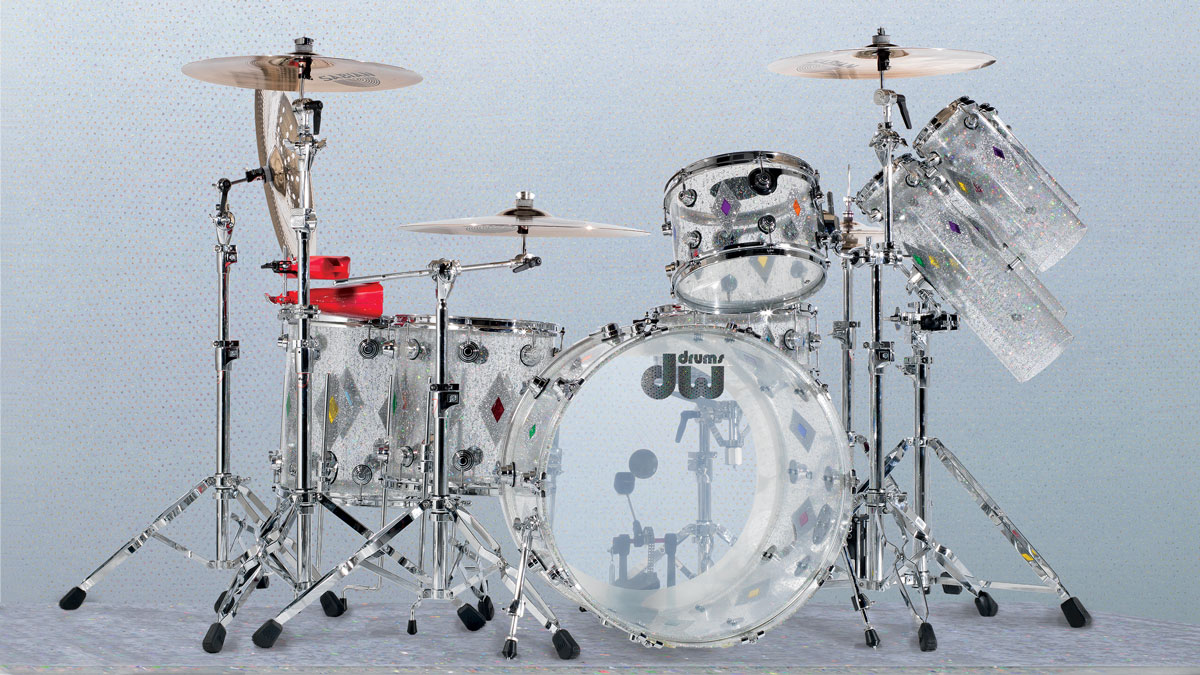
Chad's kit
DRUMS
DW Acrylic kit: 24"x18" bass drum; 12"x8" tom; 14"x14" & 16"x16" floor toms; 14"x61⁄2" snare, 10" Remo Roto Tom
CYMBALS
Sabian: 14" AAX X-Celerator hi-hats; 10" AA splash, 18" AA Medium crash, 19" AA Medium crash, 21" Vault Holy China
PLUS
Vater Chad Smith Funk Blaster model, T5 Timpani mallets
Remo heads – Controlled Sound Coated Black Dot on snare with Ambassador Hazy resonant, Controlled Sound Clear Black Dot on toms with Emperor Clear resonants, Powerstroke P4 Clear on bass drum
29" Adams Professional model timpani, LP Chad Smith model cowbell, LP Medium Jam Block
DW hardware – 5000 single pedal, 9700 cymbal stand (x2), 9701 cymbal stand, custom Octoban stand, 9500D hi-hat stand, 9991 single tom stand (x2), 9300 snare stand, 9303 small basket snare stand, 9101 throne, dwsmMG-5 clamp, dwsmMG-6 cymbal arm.